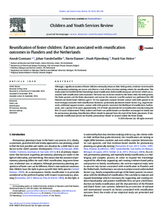Displaying 1201 - 1210 of 2221
This case study follows a foster teen's matriculation through high school and the challenges she faces while trying to achieve her dream of going to college.
This study aimed to determine whether parents with two generations of involvement in out-of-home care (themselves as children, and their own children) are at increased risk of death by suicide than parents with no involvement or parents with one generation of involvement in out-of-home care.
This chapter will critically examine the difficulties faced by young people who are looked after by local authorities in accessing mental health services and argue, based on findings of recent Serious Case Reviews that there has never been a more dangerous time to be a looked-after child.
The objectives of this study were to examine the prevalence and type of trauma exposure, and investigate the relationship between prior trauma and serious illness among foster children at end of life.
The objective of this study is to identify distinct patterns of care history by applying sequence analysis methods to longitudinal, administrative data.
This study adds to the literature by comparing the association between children's exposure to placement in care and lack of secondary education (i.e. post-compulsory education after age 16) across three Nordic countries: Denmark, Finland, and Sweden.
In this study, the authors interviewed 46 professionals who had contact with young people in residential care settings in New South Wales, Australia about their perceptions of the link between residential care and contact with the criminal justice system.
The purpose of this systematic review is to compare the associations of kinship care and non-kinship care with children's mental health and to examine the factors associated with children's mental health in kinship care and non-kinship foster care.
This study examines the use of linguistics features among male and female foster children in Malaysia in expressing their needs to improve their academic performance.
In this article, the authors explore whether current relational health (connectedness) promotes positive outcomes for child welfare-involved youth while controlling for developmental risk (history of adverse, and lack of relationally positive, experiences).

